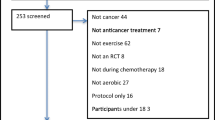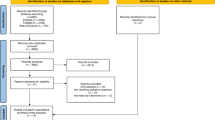Abstract
Objective
The purpose of this meta-analysis is to investigate the effectiveness of exercise interventions in patients with lung cancer (LC) during chemotherapy regarding physiological and psychological outcomes.
Methods
Databases including MEDLINE and EMBASE were used to find relevant randomized controlled trails that explored outcomes of exercise interventions for patients with LC during chemotherapy up to June 2020. Effect sizes were calculated by standardized mean difference statistics.
Results
Six studies were included that involved 244 participants with average age of 65 years. Patients with LC participating in exercise interventions during chemotherapy had significantly increased strength, forced expired volume, and quality of life as well as significantly decreased pain. Effective exercise intervention characteristics were combined aerobic and resistance exercise, performance more than 5 times a week, moderate to vigorous intensity, and 1-h sessions.
Conclusion
Supervised participation in exercise improves strength, forced expired volume, and quality of life and relieves pain and depression during chemotherapy.




Similar content being viewed by others
Data availability
N/A
References
World Health Organization (WHO) (2018) Cancer. Available from: https://www.who.int/news-room/fact-sheets/detail/cancer
National Cancer Institute (NCI) (2020) Cancer trends progress report
National Cancer Institue (NCI) (2015) Cancer stat facts: lung and bronchus cancer
Islam KM, Jiang X, Anggondowati T, Lin G, Ganti AK (2015) Comorbidity and survival in lung cancer patients. Cancer Epidemiol Biomark Prev 24(7):1079–1085. https://doi.org/10.1158/1055-9965.EPI-15-0036
Vachani A, Sequist LV, Spira A (2017) AJRCCM: 100-year anniversary. The shifting landscape for lung cancer: past, present, and future. Am J Respir Crit Care Med 195(9):1150–1160. https://doi.org/10.1164/rccm.201702-0433CI
Lu T, Yang X, Huang Y, Zhao M, Li M, Ma K, Yin J, Zhan C, Wang Q (2019) Trends in the incidence, treatment, and survival of patients with lung cancer in the last four decades. Cancer Manag Res 11:943–953. https://doi.org/10.2147/CMAR.S187317
Cavalheri V, Burtin C, Formico VR, Nonoyama ML, Jenkins S, Spruit MA, Hill K (2019) Exercise training undertaken by people within 12 months of lung resection for non-small cell lung cancer. Cochrane Database Syst Rev 6:CD009955. https://doi.org/10.1002/14651858.CD009955.pub3
Akin S, Can G, Aydiner A, Ozdilli K, Durna Z (2010) Quality of life, symptom experience and distress of lung cancer patients undergoing chemotherapy. Eur J Oncol Nurs 14(5):400–409. https://doi.org/10.1016/j.ejon.2010.01.003
Michaels C (2016) The importance of exercise in lung cancer treatment. Transl Lung Cancer Res 5(3):235–238. https://doi.org/10.21037/tlcr.2016.03.02
Quist M, Langer SW, Rorth M, Christensen KB, Adamsen L (2013) “EXHALE”: exercise as a strategy for rehabilitation in advanced stage lung cancer patients: a randomized clinical trial comparing the effects of 12 weeks supervised exercise intervention versus usual care for advanced stage lung cancer patients. BMC Cancer 13:477. https://doi.org/10.1186/1471-2407-13-477
Chen HM, Tsai CM, Wu YC, Lin KC, Lin CC (2015) Randomised controlled trial on the effectiveness of home-based walking exercise on anxiety, depression and cancer-related symptoms in patients with lung cancer. Br J Cancer 112(3):438–445. https://doi.org/10.1038/bjc.2014.612
Li S, Zhou K, Che G, Yang M, Su J, Shen C, Yu P (2017) Enhanced recovery programs in lung cancer surgery: systematic review and meta-analysis of randomized controlled trials. Cancer Manag Res 9:657–670. https://doi.org/10.2147/CMAR.S150500
Peddle-McIntyre CJ, Singh F, Thomas R, Newton RU, Galvao DA, Cavalheri V (2019) Exercise training for advanced lung cancer. Cochrane Database Syst Rev 2:CD012685. https://doi.org/10.1002/14651858.CD012685.pub2
Karvinen KH, Esposito D, Raedeke TD, Vick J, Walker PR (2014) Effect of an exercise training intervention with resistance bands on blood cell counts during chemotherapy for lung cancer: a pilot randomized controlled trial. Springerplus 3:15. https://doi.org/10.1186/2193-1801-3-15
Jastrzebski D, Maksymiak M, Kostorz S, Bezubka B, Osmanska I, Mlynczak T, Rutkowska A, Baczek Z, Ziora D, Kozielski J (2015) Pulmonary rehabilitation in advanced lung cancer patients during chemotherapy. Adv Exp Med Biol 861:57–64. https://doi.org/10.1007/5584_2015_134
Higgins JP, Altman DG, Gotzsche PC, Juni P, Moher D, Oxman AD, Savovic J, Schulz KF, Weeks L, Sterne JA, Cochrane Bias Methods G, Cochrane Statistical Methods G (2011) The Cochrane collaboration’s tool for assessing risk of bias in randomised trials. BMJ 343:d5928. https://doi.org/10.1136/bmj.d5928
Egegaard T, Rohold J, Lillelund C, Persson G, Quist M (2019) Pre-radiotherapy daily exercise training in non-small cell lung cancer: a feasibility study. Rep Pract Oncol Radiother 24(4):375–382. https://doi.org/10.1016/j.rpor.2019.06.003
Henke CC, Cabri J, Fricke L, Pankow W, Kandilakis G, Feyer PC, de Wit M (2014) Strength and endurance training in the treatment of lung cancer patients in stages IIIA/IIIB/IV. Support Care Cancer 22(1):95–101. https://doi.org/10.1007/s00520-013-1925-1
Rutkowska A, Jastrzebski D, Rutkowski S, Zebrowska A, Stanula A, Szczegielniak J, Ziora D, Casaburi R (2019) Exercise training in patients with non-small cell lung cancer during in-hospital chemotherapy treatment: a randomized controlled trial. J Cardiopulm Rehabil Prev 39(2):127–133. https://doi.org/10.1097/HCR.0000000000000410
Quist M, Langer SW, Lillelund C, Winther L, Laursen JH, Christensen KB, Rorth M, Adamsen L (2020) Effects of an exercise intervention for patients with advanced inoperable lung cancer undergoing chemotherapy: a randomized clinical trial. Lung Cancer 145:76–82. https://doi.org/10.1016/j.lungcan.2020.05.003
Lee J, Lee MG (2020) Effects of exercise interventions on breast cancer patients during adjuvant therapy: a systematic review and meta-analysis of randomized controlled trials. Cancer Nurs 43(2):115–125. https://doi.org/10.1097/NCC.0000000000000682
Redeker NS, Lev EL, Ruggiero J (2000) Insomnia, fatigue, anxiety, depression, and quality of life of cancer patients undergoing chemotherapy. Sch Inq Nurs Pract 14(4):275–290 discussion 291-278
Faul LA, Jim HS, Minton S, Fishman M, Tanvetyanon T, Jacobsen PB (2011) Relationship of exercise to quality of life in cancer patients beginning chemotherapy. J Pain Symptom Manag 41(5):859–869. https://doi.org/10.1016/j.jpainsymman.2010.07.019
Jacobsen PB, Phillips KM, Jim HS, Small BJ, Faul LA, Meade CD, Thompson L, Williams CC Jr, Loftus LS, Fishman M, Wilson RW (2013) Effects of self-directed stress management training and home-based exercise on quality of life in cancer patients receiving chemotherapy: a randomized controlled trial. Psychooncology 22(6):1229–1235. https://doi.org/10.1002/pon.3122
Zhang Y, Wang S, Chen P, Zhu X, Li Z (2016) Tai Chi for stroke rehabilitation: protocol for a systematic review. BMJ Open 6(6):e010866. https://doi.org/10.1136/bmjopen-2015-010866
Jones LW, Eves ND, Peterson BL, Garst J, Crawford J, West MJ, Mabe S, Harpole D, Kraus WE, Douglas PS (2008) Safety and feasibility of aerobic training on cardiopulmonary function and quality of life in postsurgical non-small cell lung cancer patients: a pilot study. Cancer 113(12):3430–3439. https://doi.org/10.1002/cncr.23967
Quist M, Rorth M, Langer S, Jones LW, Laursen JH, Pappot H, Christensen KB, Adamsen L (2012) Safety and feasibility of a combined exercise intervention for inoperable lung cancer patients undergoing chemotherapy: a pilot study. Lung Cancer 75(2):203–208. https://doi.org/10.1016/j.lungcan.2011.07.006
Koelwyn GJ, Wennerberg E, Demaria S, Jones LW (2015) Exercise in regulation of inflammation-immune axis function in cancer initiation and progression. Oncology (Williston Park) 29(12):908–920 922
Pedersen L, Idorn M, Olofsson GH, Lauenborg B, Nookaew I, Hansen RH, Johannesen HH, Becker JC, Pedersen KS, Dethlefsen C, Nielsen J, Gehl J, Pedersen BK, Thor Straten P, Hojman P (2016) Voluntary running suppresses tumor growth through epinephrine- and IL-6-dependent NK cell mobilization and redistribution. Cell Metab 23(3):554–562. https://doi.org/10.1016/j.cmet.2016.01.011
Granger CL, Connolly B, Denehy L, Hart N, Antippa P, Lin KY, Parry SM (2017) Understanding factors influencing physical activity and exercise in lung cancer: a systematic review. Support Care Cancer 25(3):983–999. https://doi.org/10.1007/s00520-016-3484-8
Schmitz KH, Courneya KS, Matthews C, Demark-Wahnefried W, Galvao DA, Pinto BM, Irwin ML, Wolin KY, Segal RJ, Lucia A, Schneider CM, von Gruenigen VE, Schwartz AL, American College of Sports M (2010) American College of Sports Medicine roundtable on exercise guidelines for cancer survivors. Med Sci Sports Exerc 42(7):1409–1426. https://doi.org/10.1249/MSS.0b013e3181e0c112
Author information
Authors and Affiliations
Contributions
J. L. completed the analyses and wrote the manuscript.
Corresponding author
Ethics declarations
Conflict of interest
The author declares that there is no conflict of interest.
Ethics approval
N/A
Consent to participate
N/A
Consent for publication
N/A
Code availability
N/A
Additional information
Publisher’s note
Springer Nature remains neutral with regard to jurisdictional claims in published maps and institutional affiliations.
Rights and permissions
About this article
Cite this article
Lee, J. Physiologic and psychologic adaptation to exercise interventions in lung cancer patients undergoing chemotherapy: a systematic review and meta-analysis of randomized controlled trials. Support Care Cancer 29, 2863–2873 (2021). https://doi.org/10.1007/s00520-020-05939-3
Received:
Accepted:
Published:
Issue Date:
DOI: https://doi.org/10.1007/s00520-020-05939-3




